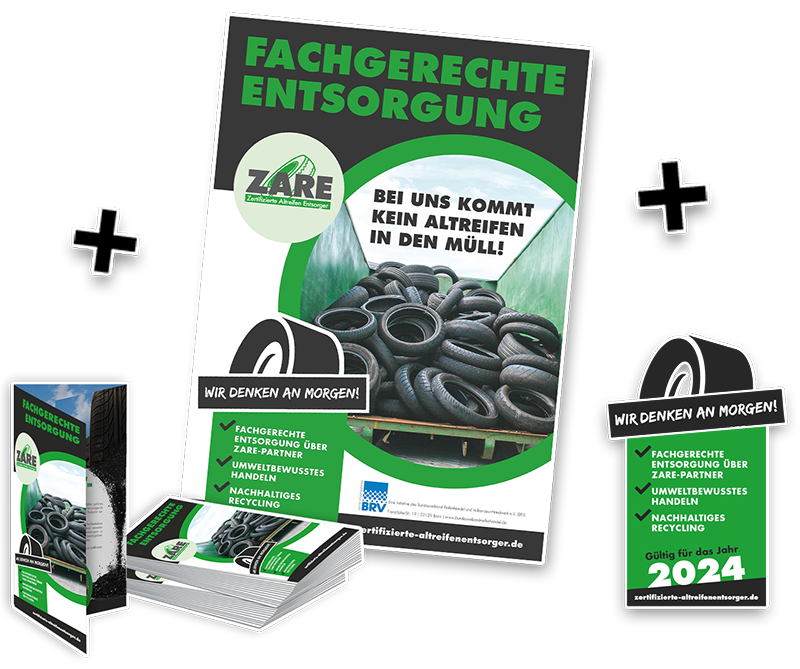Would you like to become a certified scrap tire disposal company?
Here are the requirements:
The basis of the certificate for waste tire disposal is the waste disposal companies regulation (EfbV) and industry-specific criteria, which were defined by the Federal Association of Tire Dealers and Vulcanisers (BRV). In addition, general requirements are placed on waste disposal companies that Circular Economy Act (KrWG) defined. The abridged summary, according to EfbV and KrWG, says:
You need one Surveillance Certificate by a technical monitoring organization, i.e. an excellent expert, such as the TÜV or an environmental protection organization.

§ 3 Requirements for the company organization
(1) The organization of the waste disposal company must be designed in such a way that the necessary monitoring and control of the waste management activities carried out by the company is ensured. When designing the company organization, the following must be taken into account in particular:
- the purpose of the company,
- the activities and the size of the company,
- the activities of the persons employed in the company as well as
- the type, quantity and origin of the waste to which the activities relate, in particular the hazardousness and nature of this waste.
(2) For the waste management activities carried out in the company, the responsibility as well as the decision-making and participation powers of the following persons must be specified:
- of the owner,
- the persons responsible for the management and supervision of the company,
- of the other staff as well as
- the company officers who are to be appointed for the company according to environmental or dangerous goods regulations.
The stipulations according to sentence 1 are to be presented in writing, electronically or in an equally suitable manner in the form of function descriptions and organization charts and the employees concerned are to be informed.
(3) The work processes for the waste management activities carried out in the company must be specified in writing, electronically or in a similarly suitable manner through work instructions.
§ 4 Requirements for personnel, technical equipment and other equipment
(1) The waste disposal company must appoint at least one person responsible for the management and supervision of the operation for each location to be certified, unless the owner himself is responsible for the management and supervision of the operation. If a waste disposal company has several locations or if several waste disposal companies are part of the same company, then, contrary to sentence 1, a joint person responsible for management and supervision can be appointed if this does not impair the proper fulfillment of the tasks incumbent on them.
(2) The waste management company must have sufficient other staff. This requirement is met if a professional and proper operational process is ensured with the existing other personnel.
(3) Evidence of sufficient staffing levels in accordance with paragraphs 1 and 2 is provided on the basis of a deployment plan that is to be drawn up in writing, electronically or in a similarly suitable manner. When drawing up the deployment plan, the usual absences of individuals due to vacation, illness and training measures must be taken into account.
(4) At each site to be certified and for each activity to be certified, the waste disposal company must have the technical equipment and other operating resources that are necessary for the professional and proper execution of the waste management activity.
Section 5 Operations Log
(1) To prove that the waste management activities have been carried out professionally and appropriately, the waste disposal company must keep an operations log for each location to be certified. The operations log must contain all information that is essential for proving proper management of the waste, in particular
- Information on the type, quantity, origin and whereabouts of the waste collected, transported, stored, treated, recycled, disposed of, traded or brokered by the disposal company, including documentation of the services provided,
- special incidents, in particular operational disruptions, which may affect proper waste management, including the possible causes and the measures taken to remedy them,
- the documentation of non-compliance of the collected, transported, stored, treated, recycled, disposed of, traded or brokered waste with the information provided by the waste owner or producer as well as an indication of the measures taken,
- Specification of the person commissioned with the process of collecting, transporting, storing, treating, recycling, disposal, trading or brokering and, in the case of commissioning a non-certified company pursuant to Article 7 Paragraph 3, specification of the respective scope of the commissioning and
- in the case of systems, the results of system and substance-related control tests, including functional checks as part of internal and external controls.
(2) The operations log can be kept in paper form or electronically. If individual sheets are kept for different areas of activity or parts of the company, these must be summarized on a weekly basis. The operating diary must be created in a secure manner and protected against unauthorized access. It must be visible at all times at the affected location. The information contained in the operations log shall be retained for five years after entry. The personal data referred to in paragraph 1 sentence 2 number 4 must be deleted after the period has expired.
(3) The operations log is to be checked regularly for correctness and completeness by the owner, insofar as he is responsible for the management and supervision of the operation, or by the person responsible for the management and supervision of the operation. The inspection must be documented.
§ 6 Insurance coverage
The waste management company must have adequate insurance cover for its waste management activities. The type and scope of the required insurance cover must be determined on the basis of an operational risk assessment. Insurance coverage must include:
- for companies that store, treat, recycle or dispose of waste, trade in waste or broker it, at least business liability insurance and, if the activity is also associated with the possession of this waste, environmental liability insurance and environmental damage insurance,
- for companies that collect or transport waste, at least motor vehicle liability insurance including environmental liability insurance related to the collection and transport process and environmental damage insurance.
§ 7 Requirements for the implementation of the waste management activity
(1) The waste disposal company must observe the public law regulations applicable to its waste management activity. The owner must provide evidence that the official decisions required for the waste management activities of the waste management company, in particular planning approvals, permits, approvals, permits and approvals, have been made and that the associated conditions and other orders of the responsible authorities are being fulfilled.
(2) The waste disposal company may only commission a third party within the scope of the certified activity if this is also certified as a waste disposal company with regard to the activity taken on or if the requirements of paragraph 3 are met. The responsibility of the commissioning waste management company for the proper execution of the activities remains unaffected.
(3) The waste disposal company may only commission third parties who are not certified as waste disposal companies with regard to their respective activities to carry out certified activities to an overall insignificant extent. The commissioning waste disposal company must ensure that these activities are carried out professionally and appropriately through careful selection and sufficient control. In particular, this assumes that
- the waste disposal company makes sure before placing the order that
a) the third party fulfills the requirements of paragraph 1 for the activity to be carried out,
b) the necessary monitoring and control of the activity to be carried out is ensured at the third party and
c) the third party and his staff have the necessary reliability, specialist knowledge and expertise for the activity to be carried out, - the insurance cover of the waste disposal company also extends to the activities of the third party or the third party can prove that the waste disposal company has its own insurance cover in accordance with Section 6,
- it is contractually or otherwise bindingly stipulated how the respective activity is to be carried out and where the waste is to remain,
- the waste management company is contractually entitled to issue instructions to the third party regarding the manner in which the respective activity is to be properly carried out,
- the waste disposal company is contractually granted the power to monitor the professional and proper execution of the assigned activities and
- the third party undertakes
a) to provide evidence that corresponds to the evidence prescribed in § 5, and
b) to provide the waste disposal company with a copy of this evidence without being asked.
Law to promote the recycling economy and to ensure the environmentally compatible management of waste (Closing cycle economy law – KrWG)
Section 56 Certification of Waste Management Companies
(1) Waste disposal companies contribute to the promotion of recycling management and to ensuring the protection of people and the environment in the generation and management of waste in accordance with the applicable legal provisions.
(2) Waste disposal company is a company that
- collects, transports, stores, treats, recycles, disposes of, trades in or brokers waste commercially, within the framework of commercial enterprises or public institutions and
- is certified as a specialist disposal company by a technical monitoring organization or a disposal association with regard to one or more of the activities specified in number 1.
(3) The certificate may only be issued if the company meets the requirements for the proper performance of its tasks in terms of its organisation, its personnel, technical equipment and other equipment, its activities and the reliability and specialist knowledge of its staff. The certified activities of the company, in particular with regard to its locations and systems as well as the types of waste, must be precisely described in the certificate. The certificate is to be limited. The period of validity may not exceed a period of 18 months. The existence of the requirements of sentence 1 is checked at least annually by the technical monitoring organization or the disposal community.
(4) With the issuance of the certificate, the technical surveillance organization or disposal association shall entitle the company to use a surveillance mark which bears the designation "waste management company" in connection with the reference to the certified activity and the technical surveillance organization or disposal association issuing the surveillance mark . A company may only use the surveillance mark if and for as long as it is certified as a waste disposal company.
(5) A technical monitoring organization is a legal association of several experts whose expert work is based on permanent cooperation. The certificate and the right to use the surveillance mark are issued by the technical surveillance organization on the basis of a surveillance contract, which in particular defines the requirements for operation and its monitoring as well as the issue and withdrawal of the certificate and the right to use the surveillance mark. The monitoring contract requires the approval of the competent authority.
(6) A waste disposal association is a legal association of waste disposal companies within the meaning of paragraph 2. It requires the approval of the competent authority. The certificate and the authorization to use the surveillance mark are issued by the disposal association on the basis of a statute or other regulation, which in particular specifies the requirements for the companies to be certified and their monitoring, as well as the issue and withdrawal of the certificate and the authorization to use it of the surveillance character.
(7) The technical monitoring organization and the waste disposal community must use experts who have the reliability, independence, technical knowledge and expertise required to carry out the monitoring to inspect the operations.
(8) If the requirements for issuing the certificate no longer apply, the technical monitoring organization or the waste disposal association must withdraw the certificate it issued from the company and the authorization to use the surveillance mark and request the enterprise to return the certificate and not to continue using the surveillance mark. If the company does not comply with this request within a period set by the technical monitoring organization or waste disposal association, the competent authority can withdraw the certificate issued and the right to use the monitoring mark and prohibit any further use of the designation "specialist disposal company".
Source: laws-im-internet.de
The BRV also defines industry-specific criteria for waste tire disposal companies. These include provisions regarding:
- General Requirements
- Industry-specific requirements
- Requirements for the sorting of used tires
- Disposal security requirement
- Requirements for the disposal quantities
- Insurance coverage requirement
- Requirement for the brokering of used tires
Download the catalogue Industry-specific requirements for recognition as a waste tire disposal company.



